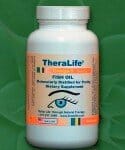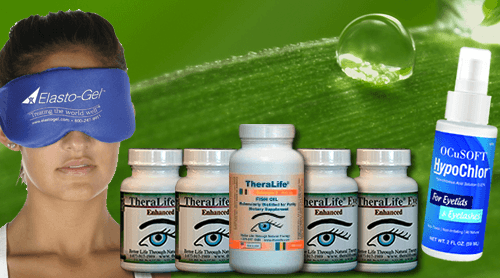Omega-3 fatty acids is present in fish oil , which can improve eye health. This nutrient can stimulate tear production, lubricate the eyes, and protect them from damage. You can take fish oil in pill form or capsules. However, not all omega 3 fish oils are created equal. You need to look for a supplement with a high level of EPA and DHA, as these are the two most important fatty acids for the body.
Molecularly Distilled Omega 3 Fish Oil – 100% Pure- TheraLife
What to Look for in an Omega 3 Supplement
It’s important to find a supplement that contains both EPA and DHA because DHA is better absorbed than EPA. The amount of EPA in the supplement is also important, as the amount in the pill may be too little or too much for your needs. When looking for a fish oil supplement, check for a third-party seal. It indicates that the product is pure. When looking for a product, remember that bioavailability refers to how well the nutrients are absorbed by your body.
It’s important to find a supplement that contains both EPA and DHA. The EPA content of the oil should be high, while the DHA content should be higher. You should also look for the third-party seal on the product, which will guarantee that it contains the best quality of fatty acids, and oleic acid is an essential component for healthy eyes. When taking an omega-3 supplement, you should always check the labels to ensure they are genuine.
Types of Omega 3 fish oil Supplements
There are several types of omega 3 fish oil supplements. Some contain more omega-3 fatty acids than others. The one most effective for your condition is the type that contains omega-3 triglycerides. It doesn’t matter whether you’re taking a liquid or capsule form, as long as it contains at least 30% of the nutrient. Just make sure you’re not taking too many of the supplements that contain these fatty acids.
In addition to eating cold-water fish, you should also consider taking oral omega-3 supplements. You’ll get more benefits from these fatty acids by consuming tuna or salmon. These products are a great option for people with dry eyes. You can even try cod liver oil in pill form if you’re unsure. You can buy fish oil in pill form from your local health food store. You can also look for fish oils in leafy vegetables and flaxseed.
Although some people find omega 3 fish oil supplements beneficial, they’re often not effective for this condition. Some people suffer from dry eyes, and fish oil supplements can reduce or even eliminate the symptoms altogether. A teaspoon of fish oil has the highest EPA and DHA levels per tablespoon. For this reason, it’s important to follow the recommended dosage. Once you’ve found a supplement that works for you, make sure you read the label.
The study’s primary outcome was a lack of a statistically significant difference between groups. Children in North America average 80mg of EPA and DHA per day, while adults consume ninety-eight milligrams. Studies have found that there are no significant differences between the two groups, but it’s important to know that the effects of fish oil on dry eyes are not clear. There is a need for more research to determine if fish oil supplements are effective for dry eye.
In the AREDS trials, 400 IU of omega 3 fish oil supplementation did not have an adverse effect on the patients. While fish oil is a good source of omega-3 fatty acids, it did not have significant effects on the symptoms of dry eyes. It did improve the function of the meibomian glands, which produce eye oils. It also helped to decrease the use of artificial tears. It is possible to take the supplements twice a week for optimum results. The AREDS formula contains 400 IU of vitamin E.
How Omega 3 Fish Oil Helps Eye Irritation
Inflammation is a major cause of dry eye. Anti-inflammatory agents present in omega 3 fish oil reduce the risk of inflammation and protect the meibomian glands. Inflammation also inhibits the growth of secondary inflammation of eye tissue. Furthermore, fish oil can improve the health of the retina. Therefore, it is important to take fish oil regularly for the eyes. Inflammation in the eye can result in cataracts, which are painful and require medical attention.
References
- Age-Related Eye Disease Study 2 research group. Lutein + zeaxanthin and omega-3 fatty acids for age-related macular degeneration: the Age-Related Eye Disease Study 2 (AREDS2) randomized clinical trial. JAMA. 2013;309(19):2005-2015.
- Appleton KM, Sallis HM, Perry R, et al. Omega-3 fatty acids for depression in adults. Cochrane Database of Systematic Reviews. 2015;(11):CD004692. Accessed at https://www.cochranelibrary.com on November 28, 2016.
- Aung T, Halsey J, Kromhout D, et al. Associations of omega-3 fatty acid supplement use with cardiovascular disease risks. Meta-analysis of 10 trials involving 77,917 individuals. JAMA Cardiology. 2018;3(3):225-234.
- Balk EM, Adam GP, Langberg V, et al. Omega-3 Fatty Acids and Cardiovascular Disease: An Updated Systematic Review. Evidence Report/Technology Assessment no. 223. Rockville, MD: Agency for Healthcare Research and Quality; 2016. AHRQ publication no. 16-E002-EF.
- Bisgaard H, Stokholm J, Chawes BL, et al. Fish oil-derived fatty acids in pregnancy and wheeze and asthma in offspring. New England Journal of Medicine. 2016;375(26):2530-2539.
- Brasky TM, Darke AK, Song X, et al. Plasma phospholipid fatty acids and prostate cancer risk in the SELECT trial. Journal of the National Cancer Institute. 2013;105(15):1132-1141.
- Chew EY, Clemons TE, Agrón E, et al. Effect of omega-3 fatty acids, lutein/zeaxanthin, or other nutrient supplementation on cognitive function. The AREDS2 randomized clinical trial. JAMA. 2015;314(8):791-801.
- Dry Eye Assessment and Management Study Research Group. N-3 fatty acid supplementation for the treatment of dry eye disease. New England Journal of Medicine. 2018;378(18):1681-1690.
- Grey A, Bolland M. Clinical trial evidence and use of fish oil supplements. JAMA Internal Medicine. 2014;174(3):460-462.
- Grosso G, Pajak A, Marventano S, et al. Role of omega-3 fatty acids in the treatment of depressive disorders: a comprehensive meta-analysis of randomized clinical trials. PLoS One. 2014;9(5):e96905.
- He K, Song Y, Daviglus ML, et al. Accumulated evidence on fish consumption and coronary heart disease mortality: a meta-analysis of cohort studies. Circulation. 2004;109(22):2705-2711.
- Kwak SM, Myung S-K, Lee YJ, et al. Efficacy of omega-3 fatty acid supplements (eicosapentaenoic acid and docosahexaenoic acid) in the secondary prevention of cardiovascular disease: a meta-analysis of randomized, double-blind, placebo-controlled trials. Archives of Internal Medicine. 2012;172(9):686-694.
- Lee Y-H, Bae S-C, Song G-G. Omega-3 polyunsaturated fatty acids and the treatment of rheumatoid arthritis: a meta-analysis. Archives of Medical Research. 2012;43(5):356-362.
- Miles EA, Calder PC. Influence of marine n-3 polyunsaturated fatty acids on immune function and a systematic review of their effects on clinical outcomes in rheumatoid arthritis. British Journal of Nutrition. 2012;107(Suppl 2):S171-S184.
- Newberry SJ, Chung M, Booth M, et al. Omega-3 Fatty Acids and Maternal and Child Health: An Updated Systematic Review. Evidence Report/Technology Assessment No. 224. Rockville, MD: Agency for Healthcare Research and Quality; 2016. AHRQ publication no. 16(17)-E003-EF.
- Office of Dietary Supplements. Omega-3 Fatty Acids: Fact Sheet for Health Professionals. Office of Dietary Supplements website. Accessed at https://ods.od.nih.gov/factsheets/Omega3FattyAcids-HealthProfessional/ on November 23, 2016.
- Orchard TS, Pan X, Cheek F, et al. A systematic review of omega-3 fatty acids and osteoporosis. British Journal of Nutrition. 2012;107(Suppl 2):S253-S260.
- Querques G, Souied EH. The role of omega-3 and micronutrients in age-related macular degeneration. Survey of Ophthalmology. 2014;59(5):532-539.
- Rizos EC, Ntzani EE, Bika E, et al. Association between omega-3 fatty acid supplementation and risk of major cardiovascular disease events: a systematic review and meta-analysis. JAMA. 2012;308(10):1024-1033.
- Sublette ME, Ellis SP, Geant AL, et al. Meta-analysis of the effects of eicosapentaenoic acid (EPA) in clinical trials in depression. Journal of Clinical Psychiatry. 2011;72(12):1577-1584.
- Sydenham E, Dangour AD, Lim WS. Omega 3 fatty acid for the prevention of cognitive decline and dementia. Cochrane Database of Systematic Reviews. 2012;(6):CD005379. Accessed at https://www.cochranelibrary.com on December 5, 2016.
- Szymanski KM, Wheeler DC, Mucci LA. Fish consumption and prostate cancer risk: a review and meta-analysis. American Journal of Clinical Nutrition. 2010;92(5):1223-1233.





